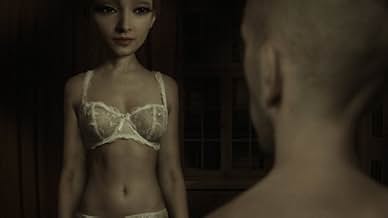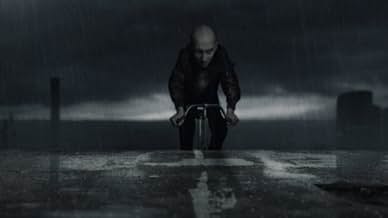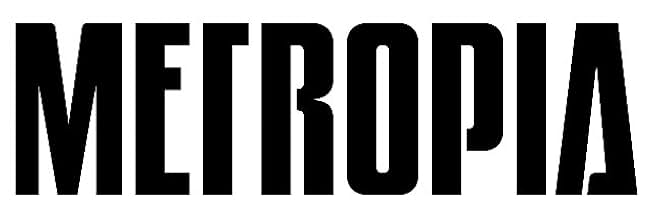IMDb रेटिंग
6.2/10
8.3 हज़ार
आपकी रेटिंग
अपनी भाषा में प्लॉट जोड़ेंA complex story of a misaligned man, though good intent, creating a nightmarish Dystopian existence.A complex story of a misaligned man, though good intent, creating a nightmarish Dystopian existence.A complex story of a misaligned man, though good intent, creating a nightmarish Dystopian existence.
- पुरस्कार
- 3 जीत और कुल 6 नामांकन
Juliette Lewis
- Nina
- (वॉइस)
Sofia Helin
- Anna Svensson
- (वॉइस)
Shanti Roney
- Karl
- (वॉइस)
Fares Fares
- Firaz
- (वॉइस)
Fredrik Eddari
- Mehmet
- (वॉइस)
Joanna Mikolajczyk Winterø
- The Metro
- (वॉइस)
- (as Joanna Zofia Bard Mikolajczyk)
Magnus Skogsberg
- Roger's Boss
- (वॉइस)
- (as Magnus Skogsberg Tear)
Lotta Bromé
- News Anchor
- (वॉइस)
फ़ीचर्ड समीक्षाएं
It's a story somewhere in the lines of 1984. Dystopian is a genre in itself and it's part of the New World Order conspiracy which has been the theme of many cinema and literature since the 50ies. So yes the core of the story is an old one and all has to come from the graphics, characters and small storyline differences.
In that aspect it's not a masterpiece but it is surely nothing to sneeze at. The animation is very okay. The characters are very average human beings which makes them easy to relate to and likable. The fact that the story is not completely new is not disturbing. Very much worth watching.
In that aspect it's not a masterpiece but it is surely nothing to sneeze at. The animation is very okay. The characters are very average human beings which makes them easy to relate to and likable. The fact that the story is not completely new is not disturbing. Very much worth watching.
One gets accustomed to certain styles of animation, not to mention certain themes. It's either for kids or adults, and it's either 2D or 3D. Of course there are exceptions but for the sake of simplicity, this Manichean duality dominates the market. It's rare that a film emerges that challenges these notions but Tarik Saleh's Metropia does that in fairly interesting ways. The style is an bit of a mash-up between 2 and 3 D - the frames are digitally composited from head shots that have been stretched and squashed then placed on smallish bodies creating creepy caricatures of the actors being photographed. The effect, visually, is of the puppetry in a Thunderbirds (or Supercar) episode as designed by Drew Friedman, with a heavy dose of dark Gilliam"esquire." despair. The animation is stiff, stylized and intentionally rough and jerky. Metropia is not super deep at it core, but it reminds me of the Heavy Metal comics I used to devour when I was a teenager, and that's not at all bad.
It's 2024, the world is running out of oil, and Europe has been connected via a huge subway system. The skies are always gray and it rains all the time. Roger, our protagonist, a bald, hydrocephalic, stoop-shouldered everyman, is afraid to take the metro because he has been hearing voices. He lives with his girlfriend who seems to always be on another planet. One morning, Roger is forced to take the metro because his bike (which he was using illegally anyway) has been destroyed. Sure enough, he begins to hear voices, a voice that has been seeping into his life away from the Metro, on top of everything. On that fateful subway ride, he sees Nina, the spitting image of the girl on his shampoo bottle - a shampoo called Dangst, if that gives any clue as to the relative depth of the film in question. On impulse - despite the urging of the voice in his head - Roger follows Nina, and discovers the world, not far beneath the surface, is not quite what it seems.
As I mentioned, the concepts are pretty thin. The requisite global corporate conspiracy, the rampant consumerism in a dysfunctional dystopia, and the soul-dead protagonist in a souls dead world, are requisite tropes for a film like this. Of course, They have been executed more competently, and in more depth, elsewhere, but the strength of Metropia is its visuals. It is animated for a reason. To that end, the spare, creepy animation style suits the film perfectly. By now, whiz-bang 3D animations are the norm, the rule, so it's at first disconcerting to see animation used so sparingly, minimally and strangely. But this is the point. The world has had all the life and energy sucked out of it, it's no wonder there's not much energy left for the inhabitants of said world. The familiar grey palette allows for even the most subdued tan coat and blonde hair of Nina's to stand out. This lack of movement is also a symbol of conformity. Literally, don't stand out.
Despite its familiar themes, Metropia is worth screening for the simple marriage of form and function it represents. It's a brave filmmaker, who, in this age of Avatar, chooses to make a quiet, simple, creepy film. Saleh, gives us a film, not breathtaking in it's scope, or necessarily ground breaking (except for what it doesn't strive to achieve: mindless spectacle) but calm, understated and worthy, for serious fans of animation, and the brand of sci if familiar to fans of Heavy Metal (the magazine, not the movie).
It's 2024, the world is running out of oil, and Europe has been connected via a huge subway system. The skies are always gray and it rains all the time. Roger, our protagonist, a bald, hydrocephalic, stoop-shouldered everyman, is afraid to take the metro because he has been hearing voices. He lives with his girlfriend who seems to always be on another planet. One morning, Roger is forced to take the metro because his bike (which he was using illegally anyway) has been destroyed. Sure enough, he begins to hear voices, a voice that has been seeping into his life away from the Metro, on top of everything. On that fateful subway ride, he sees Nina, the spitting image of the girl on his shampoo bottle - a shampoo called Dangst, if that gives any clue as to the relative depth of the film in question. On impulse - despite the urging of the voice in his head - Roger follows Nina, and discovers the world, not far beneath the surface, is not quite what it seems.
As I mentioned, the concepts are pretty thin. The requisite global corporate conspiracy, the rampant consumerism in a dysfunctional dystopia, and the soul-dead protagonist in a souls dead world, are requisite tropes for a film like this. Of course, They have been executed more competently, and in more depth, elsewhere, but the strength of Metropia is its visuals. It is animated for a reason. To that end, the spare, creepy animation style suits the film perfectly. By now, whiz-bang 3D animations are the norm, the rule, so it's at first disconcerting to see animation used so sparingly, minimally and strangely. But this is the point. The world has had all the life and energy sucked out of it, it's no wonder there's not much energy left for the inhabitants of said world. The familiar grey palette allows for even the most subdued tan coat and blonde hair of Nina's to stand out. This lack of movement is also a symbol of conformity. Literally, don't stand out.
Despite its familiar themes, Metropia is worth screening for the simple marriage of form and function it represents. It's a brave filmmaker, who, in this age of Avatar, chooses to make a quiet, simple, creepy film. Saleh, gives us a film, not breathtaking in it's scope, or necessarily ground breaking (except for what it doesn't strive to achieve: mindless spectacle) but calm, understated and worthy, for serious fans of animation, and the brand of sci if familiar to fans of Heavy Metal (the magazine, not the movie).
This film certainly is grim and grimy to look at but it is interesting and I consider that high praise. It reminds me a bit of Red Spectacles in which Mamoru Oshii has all of his film in black and white with a good film noir look, except for the spectacles, which are of doubtful utility and doubtful provenance. In this film the femme fatal is colorful and most of the rest of the crowded herd is as bland as the scenery.
What is missing here is motivation for the grand sweep of the underlying conspiracy. Like Douglas Adams wrote, "Was it just some bug eyed monster trying to take over the universe for no very good reason." In this case our hero seeks to find out why he is malcontent and why he hears voices and finds answers to both but no real solutions and this is unfortunate, because while his problems are his own the portrayed conspiratorial play has no clear purpose, unless it's just to take over the world to make money, but that is a tired and threadbare plot played out in Washington every day. Ho hum.
But his search and his Orphic trek through the underworld of a Future Europe is interesting and worth looking at. It is also interesting as a computer graphic style using live actors and reprocessing them, apparently, to cartoon proportions. This is something you get used to soon enough and so has no obvious reason, except that it is kind of neat. Perhaps I missed something.
What is missing here is motivation for the grand sweep of the underlying conspiracy. Like Douglas Adams wrote, "Was it just some bug eyed monster trying to take over the universe for no very good reason." In this case our hero seeks to find out why he is malcontent and why he hears voices and finds answers to both but no real solutions and this is unfortunate, because while his problems are his own the portrayed conspiratorial play has no clear purpose, unless it's just to take over the world to make money, but that is a tired and threadbare plot played out in Washington every day. Ho hum.
But his search and his Orphic trek through the underworld of a Future Europe is interesting and worth looking at. It is also interesting as a computer graphic style using live actors and reprocessing them, apparently, to cartoon proportions. This is something you get used to soon enough and so has no obvious reason, except that it is kind of neat. Perhaps I missed something.
So first of all: In general I am a big fan of low-budget and small films. I think thats where the real passion is.
And Metroia really was a one-man-thing. At least that what I took from it. So there is a pretty impressive achievement here. No doubt. I respect that. I like that.
So it kinda hurts me that I have to say that Metropia would have been a better short film then a feature. It sometimes just dragged. And not in a moody or artistic way (dont worry, I am all in for Tarkovsky and Co) but just with spans of scenes that are not interesting. You can argue that a certain kind of monotony helps you understand the character better. I guess thats correct. But there was still a little underwhelming taste in the end.
And Metroia really was a one-man-thing. At least that what I took from it. So there is a pretty impressive achievement here. No doubt. I respect that. I like that.
So it kinda hurts me that I have to say that Metropia would have been a better short film then a feature. It sometimes just dragged. And not in a moody or artistic way (dont worry, I am all in for Tarkovsky and Co) but just with spans of scenes that are not interesting. You can argue that a certain kind of monotony helps you understand the character better. I guess thats correct. But there was still a little underwhelming taste in the end.
I have watched this move on a hint, haven't expected it to be much, but in the end it turned out swell. The atmosphere created and the style of the movie is excellent. I have really enjoyed it, as it is not heavy, but more tranquil-food-for-thought kind of movie.
The number of allegories in the movie is overwhelming, and there are many connections with how the society functions today.
The low ratings for this movie are almost certainly there because of the complexity of the work, not because it is bad. Getting to IMDb it immediately reminded me about Aronofsky's Fountain, which had (and still has) sub par user rating compared to the quality of the work.
I think that Metropia is worthwhile and enjoyable work, and can recommend it.
The number of allegories in the movie is overwhelming, and there are many connections with how the society functions today.
The low ratings for this movie are almost certainly there because of the complexity of the work, not because it is bad. Getting to IMDb it immediately reminded me about Aronofsky's Fountain, which had (and still has) sub par user rating compared to the quality of the work.
I think that Metropia is worthwhile and enjoyable work, and can recommend it.
क्या आपको पता है
- ट्रिवियाAnna wears a T-shirt that says "Maybe he hasn't called because he's washing his hair".
- गूफ़When Anna is doodling on the mail, it is clearly seen that the debt collection agency has spelled its business as "dept collection".
- कनेक्शनReferenced in Stockholms 20th International Film Festival (2009)
टॉप पसंद
रेटिंग देने के लिए साइन-इन करें और वैयक्तिकृत सुझावों के लिए वॉचलिस्ट करें
- How long is Metropia?Alexa द्वारा संचालित
विवरण
बॉक्स ऑफ़िस
- बजट
- SEK 3,20,00,000(अनुमानित)
- दुनिया भर में सकल
- $81,305
- चलने की अवधि1 घंटा 26 मिनट
- रंग
- ध्वनि मिश्रण
- पक्ष अनुपात
- 1.85 : 1
इस पेज में योगदान दें
किसी बदलाव का सुझाव दें या अनुपलब्ध कॉन्टेंट जोड़ें































